- Physical Medicine Home
- Products
- Programs
- Applications
- Find a Clinic
- Blog
- Events
- Education & Training
- In The News
- Press Releases
In The News
< back to resultsTool helps monitor kids' concussions
December 24, 2013, 5:00am
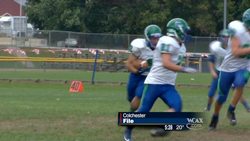 COLCHESTER, Vt. - Some schools like Colchester High School conduct baseline concussion screening tests for each athlete at the beginning of the school year. It is not a state requirement. There is some debate over the accuracy of the computer-based tests, which is why some parents are opting to have their children tested independently.
COLCHESTER, Vt. - Some schools like Colchester High School conduct baseline concussion screening tests for each athlete at the beginning of the school year. It is not a state requirement. There is some debate over the accuracy of the computer-based tests, which is why some parents are opting to have their children tested independently.
"It is a big issue because you need to make sure your athletes can return to what they did before. If you don't get a baseline test and they get hit in the head, you don't know where they are starting from in terms of making a return to play decision. So you need that to understand are they back to a baseline or for us within 15 percent of their baseline, so they can be cleared to go back into sport," said Sean Fitzgerald, a physical therapist.
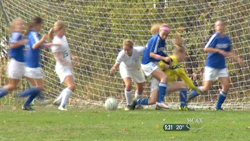 Transitions Physical Therapy uses a test that includes a review of symptoms, neuro-cognitive processing and something called a neuro-physical balance assessment, using a machine called the Biodex Balance System.
Transitions Physical Therapy uses a test that includes a review of symptoms, neuro-cognitive processing and something called a neuro-physical balance assessment, using a machine called the Biodex Balance System.
Athletes are tested with their eyes open and eyes closed on a hard surface and on a piece of foam. Their balance numbers are recorded.
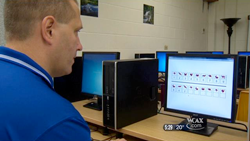 Many schools use a computer program for baseline concussion testing. Fitzgerald says the balance test is better because it can't be faked.
Many schools use a computer program for baseline concussion testing. Fitzgerald says the balance test is better because it can't be faked.
Huntyr Poulin, a seventh-grade soccer player had a balance baseline test in the summer before her season began. And during tryouts this fall, she sustained a concussion.
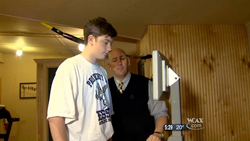 "I went up to head the ball and another girl did too and we both collided heads," she said. "I got dizzy, my head started really bugging me and it was hurting and I ended up puking in my mouth, so it wasn't the best."
"I went up to head the ball and another girl did too and we both collided heads," she said. "I got dizzy, my head started really bugging me and it was hurting and I ended up puking in my mouth, so it wasn't the best."
After several days of rest, doctors cleared Huntyr to go back to playing soccer.
"The doctors told me to close my eyes and touch my nose and I passed that and was fine. And they said I remembered everything, so they thought I was fine. But I was still continuing to have major headaches, so Sean suggested I come in and try my test again and see where I was," she said.
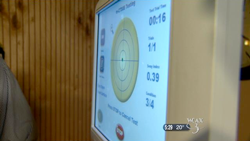 The balance test showed Huntyr was not ready to go back on the field, and was in fact getting worse.
The balance test showed Huntyr was not ready to go back on the field, and was in fact getting worse.
"She was cleared for play through the computer test on 11/14 by the trainers, but we retested her and she was still going on an upward climb of post-concussive symptoms, but she came back down and tested twice within the norm on 11/16 and again on 11/19, so we cleared her to play," Fitzgerald said. "So again, it is pretty concrete. It's like yes or no this athlete is ready to go back to training."
The problem with concussions is that it is very hard to know exactly when the brain is healed. The state mandates that all coaches, trainers and referees receive training on the signs of concussions. This balance test is now another tool available for athletes of all ages.
Related Programs



